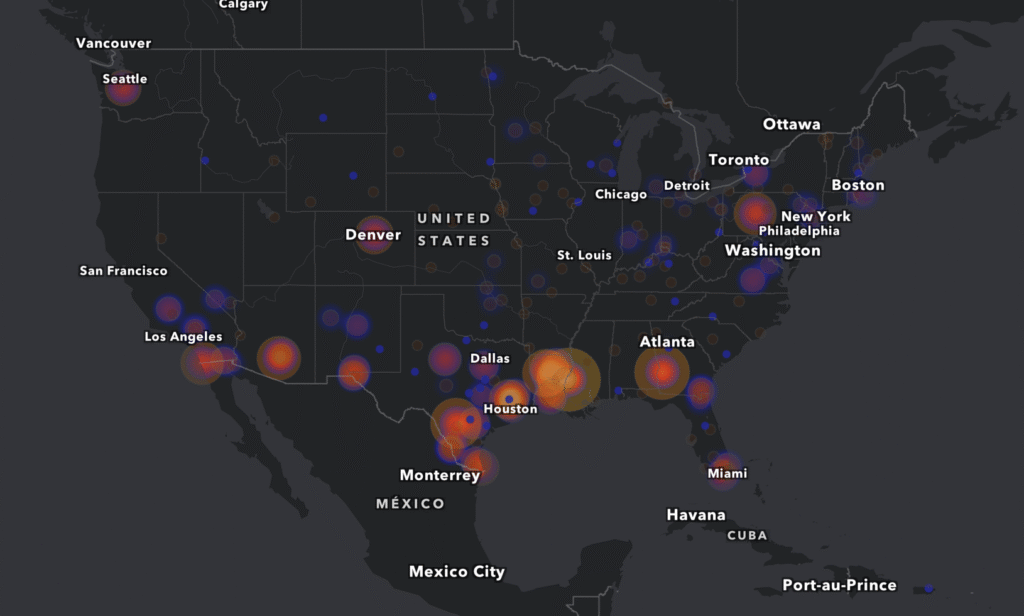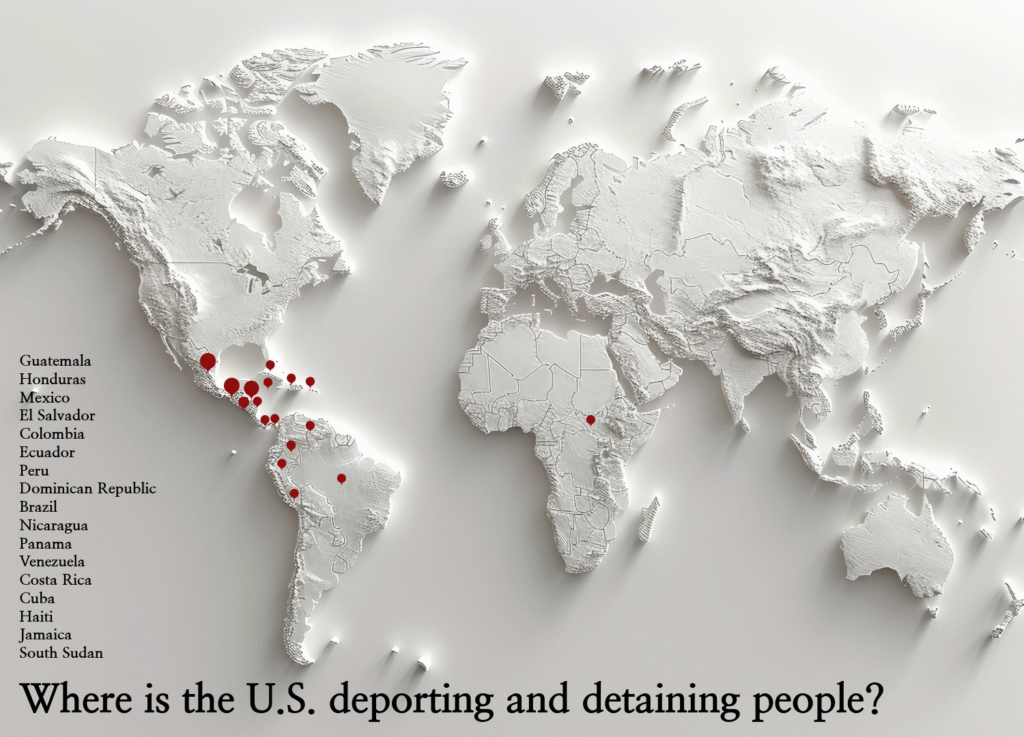by Uma Nagarajan-Swenson, AOUON Newspaper Editor + LSPC Comms Officer
On July 4 every year, millions of people across America celebrated the nation’s independence. The contradictions of this day to those denied full rights were famously articulated by Frederick Douglass in his 1852 speech addressing the Rochester Ladies’ Anti-Slavery Society:
“Your high independence only reveals the immeasurable distance between us. The blessings in which you, this day, rejoice, are not enjoyed in common. The rich inheritance of justice, liberty, prosperity and independence, bequeathed by our fathers, is shared by you, not me. The sunlight that brought life and healing to you, has brought stripes and death to me. This Fourth July is yours, not mine. You may rejoice, I must mourn.”
Over 170 years later, his points are worryingly pertinent. On “Independence” Day, President Donald Trump signed into law the ineptly-named “Big Beautiful Bill,” which is set to invest $100 billion into immigration enforcement, detention, and border patrol, funded by massive cuts to healthcare, food stamps, and social security benefits to invest. As the U.S. federal government throws money at its deadly deportation apparatus, it criminalizes the very act of seeking a safe home in a new country. This is, unfortunately, a completely logical move from the death machine known as the United States, whose historical record of enslavement, genocide, and mass incarceration has enabled a framework in which entire communities are rendered “disposable” and their bodies used for profit.
American racial capitalism is deeply entrenched within a politics of disposability that deems entire communities and populations unworthy of aid, support, or even life in America. Sociologist Henry Giroux defines a politics of disposability in America as “one in which entire populations are now considered disposable, an unnecessary burden on state coffers, and consigned to fend for themselves” (Giroux 2006). This is the logic on which America is founded: the country was built by the labor of enslaved Africans and their descendents, and centuries of genocide and forced removal of Indigenous people.
The profit motives underlying the American framework of disposability is clearly shown in the 1808 U.S. ban on “importing” enslaved people. The economic benefits of chattel slavery and its accompanying human trafficking were much too profitable to consider abolition, though: chattel slavery remained in place for over half a century following this legislation. In banning the “import” of enslaved Africans, the slave trade’s profits were fully domesticized. No money made would be leaving American land or American hands, and one did not need to own a plantation to profit from the institution of slavery. Rather, the domestic trafficking of people was a moneymaker in itself to those privileged enough to deal in the despicable business of human lives. Why import goods when you could make them on American shores?

Detention Center Tracker created by AJ Kim for Unauthorized Cities Project. Updated as of July 2025. https://www.unauthorizedcity.com/facilities.
Today, America has shifted its gaze from import to export: people viewed as disposable and vulnerable, especially to immigration enforcement, are being sent away. America has long demonstrated that any community or demographic outsider to the ruling class is dispensable in service of the state’s sinister agenda. Right now, the population so deemed is immigrants. Those lured by the promises of the “American Dream” (as my own family was) who have not dedicated their lives to the interests of the corporate billionaires running our country are treated as a burden to the state, and therefore as a burden to “real” Americans. From Haitian asylum-seekers whose legal status has been stripped to lawful permanent residents detained in functional concentration camps, the federal administration’s rhetoric is clear: immigrants are inherently and categorically “criminal,” and to America, state-ascribed criminality is enough to deny someone of their rights.
America’s democratic dream is crumbling under the weight of corporations, billionaires, and centuries of deeply entrenched imperialist racial capitalism. Rather than acknowledge the systems working perfectly to keep us down and pad the pockets of the power elite, the government has crafted and peddled the narrative that immigrants are to blame: those who are sending money home rather than spending it in America; those whose very existence here is treated a crime; those whose experiences in their home countries undermine the narratives fed to us about the American dream and the “freedom” our nation spreads worldwide. It follows, then, that America’s answer to rising poverty and inflation, housing crises, crushingly inaccessible healthcare, and all other problems is to slash spending on social services and drastically increase ICE’s funding to deport any individuals deemed un-American.
We see this in today’s prison system, described by Dr. Angela Davis as “a black hole into which the detritus of contemporary capitalism is deposited” (Davis 2003, 16). Our country’s prisons, and any carceral facility, have been created as a catch-all solution to its many unaddressed problems. The government never has enough money for schools, food, or housing, but there’s always more to be spent on prisons, police, the military, and now ICE. The deep ties between America’s immigration enforcement and prison system have been in the spotlight recently with the rapid, unfettered expansion of ICE. In a mere 8-day turnaround, construction of “Alligator Alcatraz,” a functional concentration camp masquerading as an immigration detention center. In the facility, ICE is indiscriminately detaining immigrants in chain-link metal cages under a tent surrounded by swamps. Within just four days of its opening, people detained inside report receiving just one maggot-infested meal a day, no access to phone calls or legal representation, and no access to medication. All of this is with no semblance of due process: masked ICE agents are taking people from their homes or workplaces, shackling them, and detaining them indefinitely. ICE is America’s Gestapo. They are the secret police enforcing policies of dehumanization and mass death of our time.

Terrifyingly, instead of following the practice of deportation to one’s country of origin, a practice already devastating enough, the current administration has begun deporting people to third-party countries. Over half of all people deported in March were sent to El Salvador, Guatemala, and Honduras, three of many nations strong-armed into accepting immigrants via threats of tariffs and sanctions. Trump invoked the Alien Enemies Act, falsely claiming “invasion” to justify sending hundreds of immigrants to El Salvador’s Centro de Confinamiento del Terrorismo (CECOT), a mega-prison described as a “tropical gulag” from which detainees have never been released. People incarcerated at CECOT have no visitation or mail, no books except for bibles, and no access to the outdoors. The very design of CECOT is cruel, and Trump’s enthusiastic decision to send immigrants there, as well as to “Alligator Alcatraz” and any of the other detention centers in the U.S. and in “third-party” countries, emphasizes their view that removal is no longer enough: immigration warrants punishment.
It’s hard to feel like there’s anything to celebrate or any hope to hold onto when our conditions feel overwhelmingly bleaker by the day. But Mariame Kaba reminds us that hope is a discipline that we must practice every day, and there are seeds of liberation everywhere. In cities across the US, direct actions against ICE raids have led to releases, slow-downs, and halts of detentions and deportations. People incarcerated in Salinas Valley State Prison are reclaiming autonomy and pushed for a lifted lockdown with a hunger strike. Across the world, people are looking to the people of the US to show up for one another, organize, and resist the gears that grind us down. This moment is ripe for liberatory organizing– let’s take action.

Leave a Reply